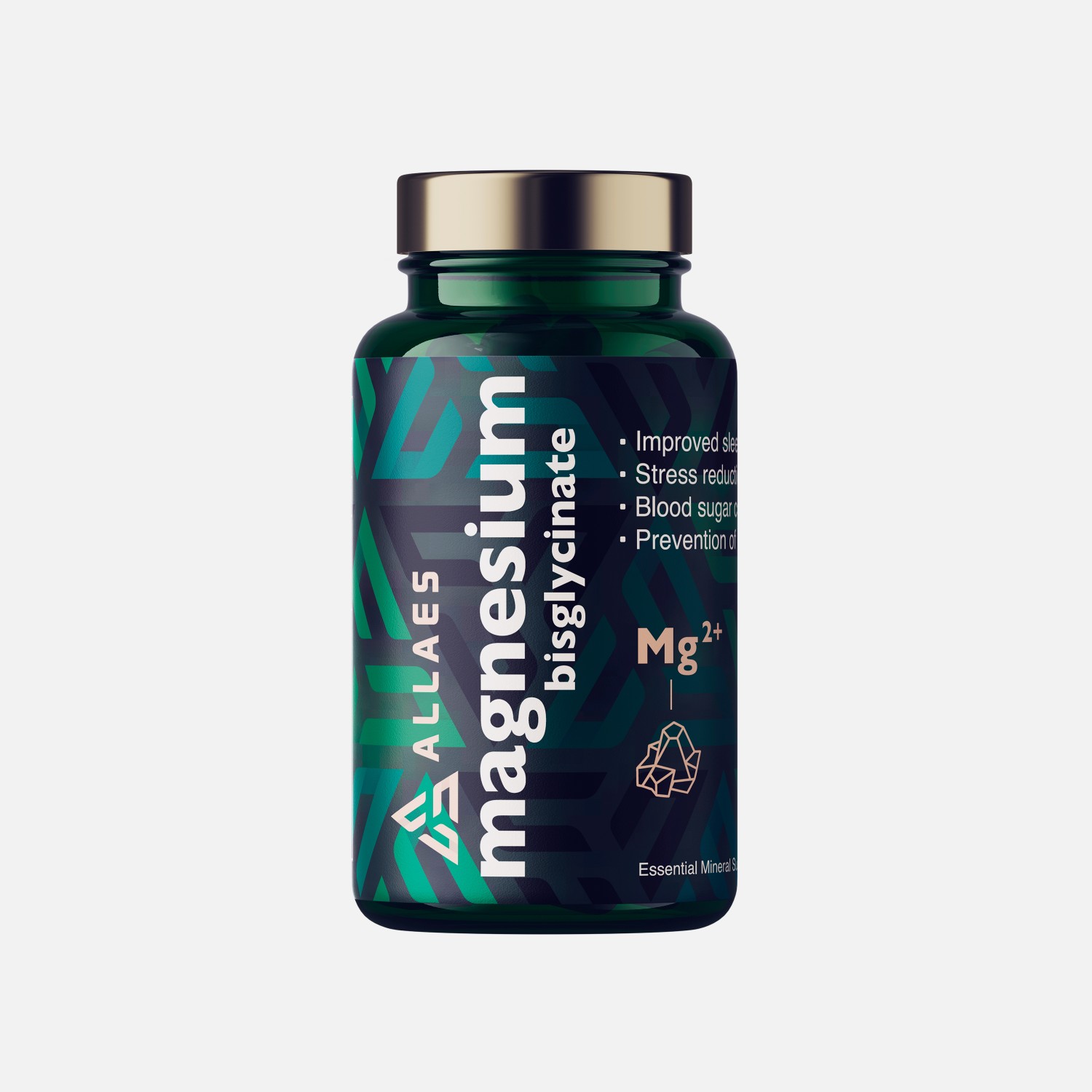



- Verfügbarkeit: Auf Lager
- Package: 650 mg / 60 capsules
Recomendated products
Wussten Sie, dass die Anwendung von Wachstumshormon bei Menschen über 35 die Dauer der Tiefschlafphase verbessert?
Taken before bed, ALCAR won't lengthen your sleep,
Mehr anzeigenWas Sie über Magnesium wissen müssen: ein wichtiger Mineralstoff für Energie und Gesundheit
Magnesium ist ein lebenswichtiger Mineralstoff, der an über 300 biochemischen Reaktionen im Körper beteiligt ist. Er beeinflusst das Nervensystem, die Proteinsynthese, die Blutzuckerregulation und den Blutdruck. Ein Magnesiummangel kann zu Müdigkeit, Muskelkrämpfen, Reizbarkeit führen und das Risiko für Herzkrankheiten, Bluthochdruck und Osteoporose erhöhen. Magnesium spielt auch eine Rolle bei der Stabilisierung der Elektrolytwerte, was besonders für Sportler und körperlich aktive Menschen wichtig ist. Magnesium unterstützt die Schlafqualität und hilft, Stress zu reduzieren, indem es das Nervensystem beruhigt.
Viele Menschen erkennen nicht, wie sehr ihr Wohlbefinden von einer ausreichenden Magnesiumzufuhr abhängt. Selbst wenn Ihre Ernährung magnesiumreiche Lebensmittel wie Nüsse, grünes Blattgemüse oder Hülsenfrüchte enthält, reicht dies oft nicht aus, um den täglichen Bedarf zu decken. Körperlicher Stress, intensives Training oder langfristige Diäten erhöhen den Magnesiumbedarf des Körpers, weshalb eine Supplementierung praktisch und oft notwendig ist.
Magnesium gehört zu den häufigsten Nährstoffmängeln
An dieser Stelle könnte man sich fragen:
„Also warum ist Magnesium wichtiger als andere Nährstoffe?“
Die Antwort ist einfach – weil Magnesiummangel extrem weit verbreitet ist.
Schätzungen zufolge könnten bis zu 75 % der Erwachsenen regelmäßig nicht genügend Magnesium aufnehmen.
Das Problem ist, dass Sie möglicherweise nichts bemerken, bis ein Bluttest den Mangel zeigt – und bis dahin könnte der Mangel Ihre Gesundheit über Jahre unbemerkt geschädigt haben. Deshalb ist es wichtig, magnesiumreiche Lebensmittel zu essen oder bei Bedarf Nahrungsergänzungsmittel einzunehmen.
Unten sind die Risikogruppen aufgeführt, in denen bei Krankenhausaufenthalten häufig ein klinischer Magnesiummangel festgestellt wird.
| Bevölkerungsgruppe | Häufigkeit des Mangels |
|---|---|
| Allgemeine Bevölkerung in den USA | 57 % |
| Patienten auf der Intensivstation (ICU) | >65 % |
| Sportler | 45–60 % |
| Menschen mit Typ‑2‑Diabetes | 11–48 % |
| Ältere Frauen (Europa) | 48 % |
Wer kann von Magnesium profitieren?
✔ Wenn Sie hohen Stress oder Angst erleben: Magnesium hilft, das Nervensystem zu beruhigen, die Schlafqualität zu verbessern und Angstzustände zu reduzieren. Es ist besonders hilfreich für Personen, die täglich mit mentaler oder emotionaler Überlastung zu tun haben.
✔ Wenn Sie Sportler sind: Intensives Training erhöht den Magnesiumverlust durch Schweiß, was einen Mangel bei Sportlern häufig macht. Magnesium unterstützt die Muskelentspannung, beschleunigt die Erholung und reduziert das Risiko von Krämpfen nach körperlicher Belastung.
✔ Wenn Sie hohen Blutdruck oder Herzprobleme haben: Magnesium hilft, den Blutdruck zu regulieren und unterstützt einen normalen Herzrhythmus. Niedrige Magnesiumwerte können zu Bluthochdruck beitragen, und eine Supplementierung kann die Herzgesundheit fördern.
✔ Wenn Sie älter sind: Ein Magnesiummangel ist mit dem Alter häufiger aufgrund von Veränderungen im Stoffwechsel und der Nährstoffaufnahme. Die Einnahme von Magnesium kann helfen, die Knochengesundheit zu erhalten, den Schlaf zu verbessern und die allgemeine Vitalität älterer Menschen zu unterstützen.
✔ Wenn Sie Typ‑2‑Diabetes haben: Magnesium spielt eine Schlüsselrolle bei der Insulinfunktion und dem Glukosestoffwechsel. Niedrige Magnesiumwerte reduzieren die Insulinsensitivität, wodurch es schwieriger wird, Zucker aus dem Blut aufzunehmen. Menschen mit Typ‑2‑Diabetes sind oft magnesiumdefizitär. Dieser Mangel kann die Insulinresistenz verschlimmern – ein Zustand, bei dem Zellen schlecht auf Insulin reagieren, was zu erhöhten Blutzuckerspiegeln führt. Eine ausreichende Magnesiumversorgung durch Ernährung oder Supplementierung kann helfen, die Insulinsensitivität zu verbessern und eine bessere Blutzuckerregulation zu unterstützen.
Wie nimmt man Magnesium richtig ein?
Empfohlene Zufuhr: Die empfohlene tägliche Zufuhr an elementarem Magnesium variiert je nach Alter und Geschlecht:
- Männer (19–30 Jahre): etwa 400 mg/Tag
- Männer (31+ Jahre): etwa 420 mg/Tag
- Frauen (19–30 Jahre): etwa 310 mg/Tag
- Frauen (31+ Jahre): etwa 320 mg/Tag
- Schwangere Frauen: etwa 350–360 mg/Tag
- Stillende Frauen: etwa 310–320 mg/Tag
Jede Kapsel unseres Magnesium‑Bisglycinats liefert 84,5 mg elementares Magnesium. Da Magnesium auch in Lebensmitteln vorkommt, ist es sinnvoll, mit 1–2 Kapseln am Abend zu beginnen und die Dosis bei Bedarf zu erhöhen. Bei schwerem Mangel oder intensivem körperlichem Training kann die tägliche Gesamtzufuhr auf 600–800 mg steigen.
Wann einnehmen: Magnesium wird am besten vor dem Schlafengehen eingenommen, da es die Entspannung fördert und zu besserem Schlaf beiträgt.
Wie lange einnehmen: Wenn Sie an einem Mangel leiden, sollte Magnesium über mehrere Wochen oder Monate kontinuierlich eingenommen werden, um optimale Werte wiederherzustellen und aufrechtzuerhalten. Eine regelmäßige Anwendung ist besonders wichtig bei Stress, intensivem Training oder restriktiven Diäten.
Wie wirkt Magnesium?
Magnesium ist ein kritischer Mineralstoff, der viele lebenswichtige Prozesse im Körper beeinflusst. Die Supplementierung mit Magnesium kann in vielen Situationen vorteilhaft sein, da sie mehrere biologische Systeme unterstützt. So beeinflusst Magnesium Ihre Gesundheit:
- Zellfunktion und Glukoseregulation. Magnesium ist an über 300 biochemischen Reaktionen beteiligt, einschließlich solcher, die den Blutzuckerspiegel regulieren. Es spielt eine Schlüsselrolle dabei, wie Zellen Glukose aufnehmen, und unterstützt die Funktion der pankreatischen Betazellen – jene, die Insulin produzieren.
- Magnesium und Entzündungen. Niedrige Magnesiumwerte können zu einem Anstieg systemischer Entzündungen führen. Chronische Entzündungen sind ein bekannter Faktor, der zu Typ‑2‑Diabetes und seinen Komplikationen beiträgt. Magnesium hat entzündungshemmende Effekte, die helfen können, dieses Risiko zu reduzieren.
- Herz‑ und Gefäßgesundheit. Magnesium unterstützt einen normalen Herzrhythmus und hilft, den Blutdruck zu regulieren. Es entspannt die glatte Muskulatur in den Blutgefäßwänden, was den Gefäßwiderstand senkt und die Durchblutung verbessert. Dies hilft, den Blutdruck zu senken und das Risiko für Herz‑Kreislauf‑Erkrankungen zu reduzieren.
- Nervensystem‑Unterstützung. Magnesium spielt eine Schlüsselrolle bei der Nervenübertragung und der neuromuskulären Signalgebung. Es hilft, Stress zu reduzieren, beruhigt das Nervensystem und verbessert die Schlafqualität. Menschen mit Angstzuständen oder Schlafstörungen können von einer ausreichenden Magnesiumzufuhr profitieren.
- Muskel Funktion und Erholung. Magnesium ist notwendig für eine ordnungsgemäße Muskelfunktion. Es hilft den Muskeln, sich zu entspannen, und kann Krämpfe oder Spasmen verhindern, insbesondere in den Beinen. Dies ist besonders relevant für körperlich aktive Personen oder solche, die häufig Muskelverspannungen erleben.
- Energie Stoffwechsel. Magnesium trägt zur zellulären Energieproduktion bei, indem es direkt an der Synthese von ATP (Adenosintriphosphat) beteiligt ist – dem Molekül, das Energie innerhalb der Zellen speichert und liefert. Magnesiummangel kann zu Müdigkeit und verminderter körperlicher Leistung führen.
- Knochen‑ und Zahngesundheit. Magnesium hilft, den Kalziumstoffwechsel zu regulieren und sorgt für die richtige Mineralisierung von Knochen und Zähnen. Es spielt auch eine Rolle bei der Erhaltung der Knochendichte. Ein Mangel kann das Risiko von Osteoporose erhöhen, insbesondere im Alter.
- Unterstützung der Verdauung. Magnesium entspannt die Muskeln im Verdauungstrakt, was einen gesunden Stuhlgang fördert. Es kann hilfreich sein für Personen mit Verstopfung oder unregelmäßiger Verdauung.
- Stressabbau und Schlafqualität. Magnesium hat beruhigende Eigenschaften. Es kann Stress reduzieren, nächtliches Erwachen verringern und die Gesamtdauer sowie Tiefe des Schlafes verbessern, insbesondere bei Personen mit chronischer Anspannung oder Überstimulation.
- Immunsystem‑Funktion. Magnesium hilft, die Immunantwort zu regulieren, indem es die Aktivität von Immunzellen unterstützt. Dies stärkt die Fähigkeit des Körpers, Infektionen zu bekämpfen und Entzündungen zu kontrollieren.
Zusammensetzung ist entscheidend!
Die meisten Magnesiumpräparate auf dem Markt verwenden Magnesiumoxid – eine günstige Form mit extrem niedriger Bioverfügbarkeit (nur etwa 4 % wird absorbiert, die restlichen 96 % werden ausgeschieden) [1]. Im Gegensatz dazu enthält unsere Formel Magnesiumbisglycinat, eine hoch absorbierbare chelatierte Form mit bis zu 67 % Bioverfügbarkeit [2]. Seine Struktur schützt die Magnesiummoleküle davor, von Phytaten und anderen Inhibitoren im Verdauungstrakt gebunden zu werden, was die Absorption erheblich verbessert [3].
Magnesiumbisglycinat ist auch magenfreundlicher. Im Gegensatz zu Magnesiumcitrat, das weit verbreitet ist und eine Bioverfügbarkeit von etwa 30 % hat [4], verursacht es keine Verdauungsnebenwirkungen. Citrate wird häufig medizinisch als Abführmittel verwendet und steht im Zusammenhang mit Durchfall, Blähungen, Übelkeit und Bauchschmerzen bei empfindlichen Personen [5][6]. Bisglycinat hingegen wird effizienter im Magen absorbiert und verursacht diese Nebenwirkungen nicht.
Klinische Daten zeigen außerdem, dass Magnesiumbisglycinat die bevorzugte Form nach Magenoperationen ist, bei denen Magnesiumoxid aufgrund schlechter Absorption den Magnesiumstatus nicht wiederherstellen kann [7].
Magnesium ist entscheidend für moderne Lebensweisen und absolut unverzichtbar für Sportler. Magnesiumbisglycinat ist die fortschrittliche Wahl für diejenigen, die echte Ergebnisse von ihren Ergänzungsmitteln erwarten.
Vorteile für PEDs‑Nutzer
Athleten – insbesondere diejenigen, die PEDs (anabole Steroide oder verwandte Verbindungen) verwenden – gehören zu den Gruppen mit dem höchsten Risiko für Magnesiummangel. Mehrere Schlüsselfaktoren tragen dazu bei: Magnesiumverluste durch Schweiß und Urin steigen während des Trainings um 10–20 % [8], und regelmäßige, intensive körperliche Aktivität beschleunigt den Abbau weiter. Wenn die zellulären Magnesiumwerte sinken, verlangsamt sich die Erholung, die Leistung nimmt ab und das Risiko von Komplikationen steigt. Wichtige Folgen eines Magnesiummangels umfassen:
- Muskelverletzungen: Sportler mit niedrigen Magnesiumwerten haben ein um bis zu 30 % höheres Risiko für Mikroverletzungen und Gewebeschäden [9][10]. Magnesium spielt eine entscheidende Rolle bei Muskelkontraktion und –entspannung. Ein Mangel erhöht die Wahrscheinlichkeit von Krämpfen, Zerrungen und Muskelverletzungen.
- Verringerte Ausdauer: Magnesium ist direkt am Lactatstoffwechsel beteiligt, einem der wichtigsten Marker für Muskelermüdung. Niedrige Magnesiumwerte beeinträchtigen die Ausdauerleistung, insbesondere bei hochintensivem oder lang andauerndem Training.
Statistiken zu Magnesiummangel bei Sportlern
- USA: 60 % der Athleten in gewichtsbezogenen Sportarten (z. B. Ringen, Gymnastik) nehmen weniger als die empfohlene tägliche Magnesiumzufuhr auf (<260 mg/Tag für Männer, <220 mg/Tag für Frauen) [8].
- Europa: Magnesiummangel wird bei 45 % der Profifußballer und Läufer festgestellt [11].
- Athleten mit einer Vorgeschichte von Muskelzerrungen oder Sehnenschmerzen weisen häufig niedrigere intrazelluläre Magnesiumwerte auf [9].
Auswirkungen synthetischer Hormone auf den Magnesiumstatus
PEDs – insbesondere anabole Steroide – erhöhen den Magnesiumbedarf des Körpers. Dies liegt an der Rolle von Magnesium bei der Aktivierung von Hormonrezeptoren und der Aufrechterhaltung der Muskelfunktion. Bei niedrigen Magnesiumwerten steigt das Verletzungsrisiko, die Erholung verzögert sich und die Trainingseffizienz sinkt.
Anabole Steroide können den Magnesiumstoffwechsel stören, indem sie die Aktivität der Magnesiumrezeptoren unterdrücken, was die Verfügbarkeit von Magnesium im Blut verringert. Magnesium ist auch für das ordnungsgemäße Funktionieren des HGH‑Signalwegs (Wachstumshormon) wichtig, der die IGF‑1‑Produktion in der Leber – einen wichtigen anabolen Faktor – antreibt [12][13].
Bei niedrigen Magnesiumwerten werden HGH‑Rezeptoren weniger empfindlich, und die IGF‑1‑Produktion sinkt. Dies wirkt sich direkt auf Muskelwachstum, Kraftzuwachs und Erholung aus. In Tierstudien verringerte ein Magnesiummangel die IGF‑1‑Spiegel um 44 % in 12 Tagen und um 60 % nach drei Wochen einer magnesiumarmen Ernährung [12].
Deshalb ist es wichtig, die Magnesiumzufuhr während Trainingszyklen zu überwachen und zu unterstützen – insbesondere bei der Verwendung von PEDs – um den hormonellen Gleichgewicht zu erhalten und die anabole Reaktion zu maximieren.
Quellen
[1] Bioavailability of US commercial magnesium preparations
[2] Magnesium supplementation bioavailability
[3] Magnesium bisglycinate profile and advantages
[6] Tolerable upper intake level for magnesium supplementation in adults
[7] Magnesium glycinate in bariatric and athletic populations
[8] Relationship between magnesium and exercise
[9] Magnesium status in elite international track & field athletes
[10] Impact of magnesium supplementation in muscle damage
[11] Magnesium status and stress





